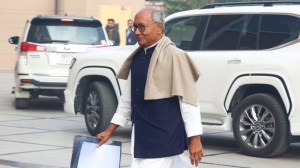Children from heaven
The German theologian Dietrich Bonhoeffer once said,The test of the morality of a society is what it does for its children.
With the objective of increasing adoptions of orphans,Catalysts for Social Action (CSA) has brought rural and city adoption agencies together and is hoping for more government involvement
The German theologian Dietrich Bonhoeffer once said,The test of the morality of a society is what it does for its children. If that were the case,then our society was doing very badly indeed,until recently when things seem to have changed for the better.
For many years after independence,adopting a child was very difficult for couples,especially for non-Hindu couples. Hindu couples were allowed to adopt,while non-Hindu couples could only be ‘guardians’ for a child. Other staggering problems included the stalling of the adoption process. Meanwhile,according to UNICEF,there were an estimated 25 million orphans in our country,with roughly eight million falling under the 0-6 age category (the age when they can be legally adopted).
The formation of our organisation was the outcome of an adoption in the family, says Bharati Dasgupta. We were struck by the ease with which the child adapted to its new home. But the process itself was so tedious; we had to wait for a really long time before being united with the child. That is when we decided to start the organisation,so that other parents wouldn’t face the same problem.
Thus Catalyst for Social Action (CSA) began six years ago. Working with a few adoption agencies in the city,they found a curious phenomenon: There were really long waiting lists of parents,but very few children up for adoption. However,when they visited rural areas like Latur and Nanded,they found that a lot of children were up for adoption,but very few prospective parents were interested. The CSA thought of bringing the city and rural agencies together,so that the problems of both might be solved. Initially,both the city and the rural agencies were skeptical,and said that city parents would not be interested in rural children. However,the city parents’ only concern was that the child be healthy. Apart from that,they had no qualms, says Dasgupta.
In India,for a long time,children could be adopted from orphanages. However,due to the commercial aspects of some of the orphanages,a PIL was filed,seeking an end to the unethical practices,forcing the government to rethink its laws. Today,only a certain number of agencies are allowed to have children for adoption. CARA (Central Adoption Resource Authority),which works under the Women and Child Council of the government,is one of the best things that has happened. They have an excellent resource system and process-the only thing mising is more focussed monitoring of the situation, says Dasgupta.
CSA,now working in Maharashtra and Orissa,hopes to raise awareness about adoption through a series of workshops and interactive sessions with would-be parents. They have also taken steps to bring the government into the picture,by offering to help set up an adoption helpline. Seeking this,they recently submitted a petition to the Prime Minister,with over 10,000 signatures. They also released a book titled A Family for every child: Perspectives of adoption in India,which contains articles by people from all walks of life,who have adopted children themselves,or are associated with adoption.
What we need is a database of all orphans in the country. We recently stumbled across a two-month old baby in an orphanage,who should have ideally been put up for adoption. We were able to successfully send the baby to an adoption agency,and it was adopted soon thereafter. Such a phenomenon only happens because of a lack of awareness and database, Dasgupta says.
However,according to her,the scenario looks promising,especially with the perception of people changing for the better. Dasgupta says,Today,when parents come looking for a child,they dont ask which caste the child belongs to,or which religion did the parents follow. This is a huge development,which has happened only over the past 10 years,for which CARA is solely responsible.
She stresses on the need for increased government involvement. This issue has to be in the government and public focus. We still have to spread a great deal of awareness among the masses. After all,its not about us; we have to save the orphans, she concludes.







